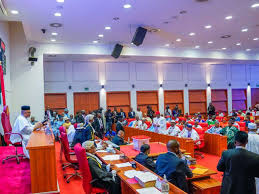The Senate has called for urgent reforms to Nigeria’s budgeting process to better tackle the country’s current social and economic challenges.
Chairman of the Senate Committee on Finance, Senator Mohammed Sani Musa, made the call while representing Nigeria at the ongoing Spring Meetings of the World Bank and International Monetary Fund (IMF) in Washington, D.C. According to a statement from his media office on Sunday, Musa spoke on the sidelines of an Investors’ Forum in the United States.
He specifically urged the executive arm of government to initiate Nigeria’s long-overdue transition to a Results-Based Budgeting (RBB) system, emphasizing that monetary reforms must be complemented by urgent and far-reaching fiscal reforms to sustain current economic momentum.
Musa called on the Minister of Finance and Coordinating Minister of the Economy, Mr. Wale Edun, and the Minister of Budget and National Planning, Senator Atiku Bagudu, to work collaboratively in implementing the shift to RBB.
Commending the Central Bank of Nigeria (CBN) for the credibility its reforms have brought to Nigeria’s economy, Musa noted that the presence of high-ranking global financial leaders and institutional investors at the meetings signals growing international confidence in Nigeria’s economic direction.
“The events in New York and Washington have reaffirmed global confidence in Nigeria’s commitment to economic transformation,” Musa said. “I commend the leadership of the Central Bank under Mr. Yemi Cardoso for the renewed credibility and trust in our financial system, which I attribute to the courageous leadership of President Bola Ahmed Tinubu.”
He described Nigeria’s reform agenda as bold and visionary, grounded in market principles and transparency. However, he stressed that these financial sector reforms must be supported by deeper fiscal reforms, starting with an overhaul of Nigeria’s budgeting system.
“It is time for Nigeria to transition from the outdated envelope budgeting system to a Results-Based Budgeting model,” he said. “This performance-oriented approach, coupled with comprehensive tax reforms, will enhance fiscal discipline, improve service delivery, and strengthen our economy.”
Musa added that aligning Nigeria’s public financial management practices with global standards is crucial for achieving national development priorities.
He reaffirmed the National Assembly’s readiness to support legislative actions necessary to drive these reforms and ensure that Nigeria’s economic policies remain credible, sustainable, and attractive to investors.
Nzubechukwu Eze.









